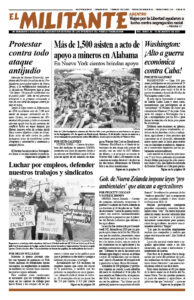Some 900 Rio Tinto aluminum workers in Kitimat, British Columbia, members of Unifor Local 2301, set up picket lines July 25 after their contract expired. The strike followed seven weeks of fruitless negotiations and a 100% strike vote.
The strikers operate Rio Tinto’s massive aluminum smelting plant in Kitimat and the powerhouse in Kemano, which furnishes the plant’s electricity. Kitimat is on the west coast about 900 miles north of Vancouver.
“Rio Tinto was given every opportunity to reach a fair deal but showed complete disregard for our issues,” Local President Martin Mcllwrath said in a July 24 news release. “The difficult and demanding work our members do has made this facility a success for generations. We deserve nothing less than an agreement that respects us, and we will stand up for our rights.”
Pensions, retirement benefits, health, safety, jobs and respect are key issues. The company is demanding changes to workers’ retirement pay and benefit levels, including putting younger workers out of the current more secure defined pension contribution plan into a worse defined benefit plan that would be less costly for the bosses.
Negotiations have also focused on a backlog of more than 300 grievances based on the company’s use of contract workers and refusal to hire full-time workers.
Despite the picket lines, the bosses continue to operate the smelter and powerhouse with 265 management personnel under an “essential services” order granted by the British Columbia Labor Relations Board. The bosses say they will run the smelter at 35% of normal capacity until the strike is settled.
Rio Tinto, an Anglo-Australian multinational headquartered in London, is the world’s second-largest metals and mining corporation. It produces iron ore, copper, diamonds, gold and uranium, with 45,000 employees in 35 countries.
Solidarity messages and financial contributions can be sent to unifor2301@unifor2301.org or Unifor Local 2301, 235 Enterprise Ave., Kitimat, B.C. V8C 2C8.


